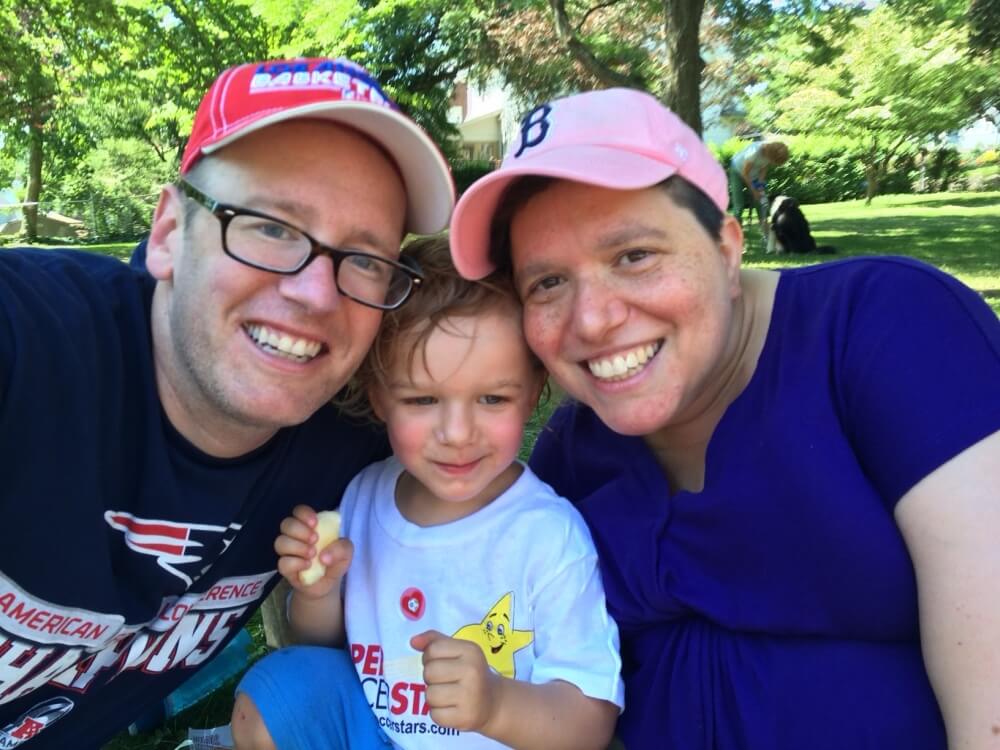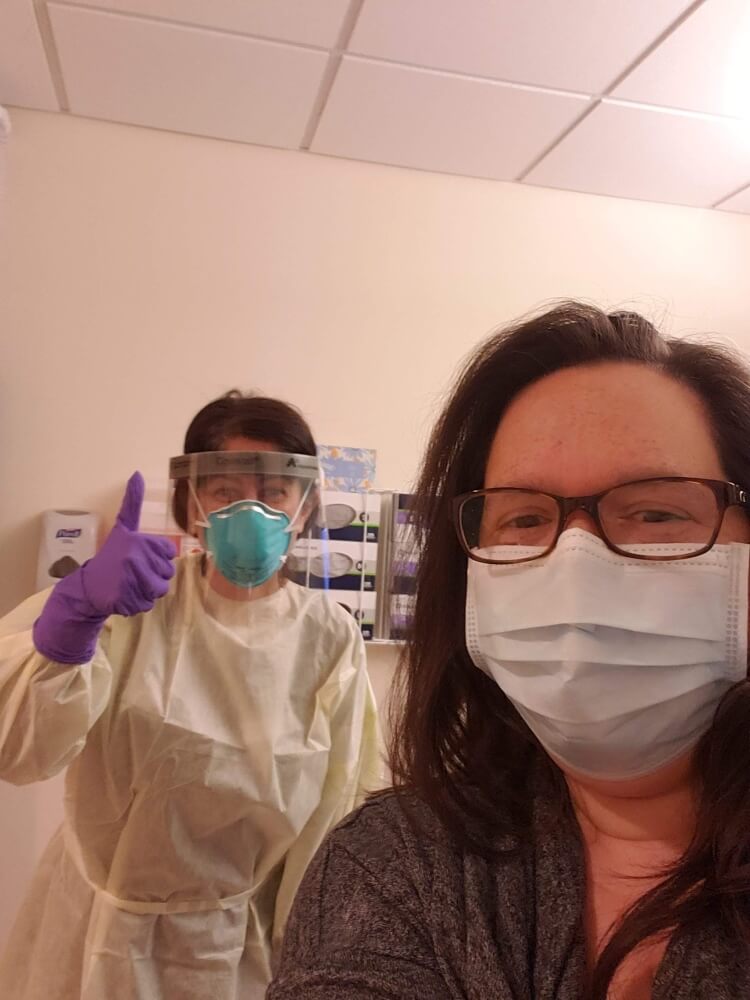Just over a year after giving birth to her son, Emmett, Abigail Myers faced a devastating diagnosis of breast cancer in March 2014.
It started when Myers woke up one morning feeling sore. When she found a lump, she rushed to her doctor, all the while in disbelief that she might have cancer.
A resident of Belmont, Mass., Myers visited a local hospital in Cambridge where doctors performed an ultrasound, a mammogram, and a biopsy. The results showed that she had triple-positive breast cancer — meaning the tumor cells had estrogen receptors, progesterone receptors, and HER2 receptors.
“It was a shock,” Myers says. At the top of her mind was her son and a concern that she would not have the chance to see him grow up.
After her diagnosis, Myers and her husband sought out Dana-Farber for a second opinion. From the very first call to make an appointment, Myers says she felt safe and comforted by the knowledge that at Dana-Farber, everyone specializes in caring for patients with cancer.
Her team is led by Erica Mayer, MD, MPH, a Dana-Farber breast oncologist in the Susan F. Smith Center for Women’s Cancers at Dana-Farber Brigham Cancer Center and director of clinical research in the Breast Oncology Program, Mayer treats patients, but also designs and leads clinical trials to identify new therapies for treating patients with breast cancer — expertise that would soon come to serve Myers.

From treatment to management
At first, Myers’ cancer had only spread locally, and treatment began with a double mastectomy, radiation, chemotherapy, and hormone therapy. Despite all this, in May 2015, testing revealed that Myers’ cancer had spread. She had been experiencing what she describes as pain that felt like she had pulled muscles in her hip and neck. It turns out that this was a symptom of her cancer spreading to her bones.
The pain was so debilitating that Myers had to use a wheelchair. But her team at Dana-Farber prescribed and oversaw radiation for the tumor in her hip, and Myers was soon able to walk again. It’s because of that success that Myers calls radiation a “miracle.”
In the eight years since then, Mayer, Elahe Salehi, DNP, and Myers have worked together to manage her stage IV metastatic breast cancer while providing the best quality of life possible for Myers. This marked a new chapter for Myers at age 39; she jokes that she left her graphic design job in the non-profit sector to become a full-time patient.
Mayer and Salehi have administered multiple lines of treatment, which include many that have resulted from research performed at Dana-Farber.
“The trajectory of breast cancer treatment in general, specifically HER2 directed therapies has changed significantly from a decade ago,” Salehi says.
There are many new agents that Myers has been treated with including T-DM1, otherwise known as trastuzumab emtansine, and trastuzumab deruxtecan. Myers herself took part in the HER2CLIMB trial which studied the effectiveness of the new oral agent tucatinib, a targeted compound that binds to a different portion, or domain, of the HER2 protein than other existing drugs. As with any chemotherapy agent, it eventually became less effective, but Salehi says that this was likely the regimen that worked for the longest for Myers.
“Abby is a strong and resilient individual and has an amazing personality,” Salehi says.

Living with metastatic breast cancer
Over the years, Myers has faced hospital admissions for low blood cell counts, for which she had to miss her son’s third birthday; two broken feet after her bones were made more brittle by chemotherapy; and brain surgery when it was found that her breast cancer had metastasized there.
But despite these setbacks and intense treatments, Myers has continued to find ways to enjoy her life. “It’s weird the things that you kind of get used to,” she remarks.
With two air casts around her feet, she and her friend recently made a trip to Hawaii to enjoy the beaches and sunshine.
“My friend told me I looked like a transformer,” she laughs.
Myers credits her ability to make the most of her life to her comprehensive support system, which includes Dana-Farber and her providers.
“They are all truly wonderful human beings and I wish everyone could have a team as amazing as mine,” she says.
For Salehi, Myers isn’t just a patient: she is an individual that Salehi has come to know well. Their appointments are equal parts social catch-up and medical counseling.
“We want to be here for them,” Salehi says. “In their good days and their bad days, no matter what it takes.”
Outside of treatment, Myers attends two support groups organized by Dana-Farber’s Division of Social Work: a metastatic breast cancer group and another geared towards young patients. The group’s shared understanding of cancer has led to new friendships for Myers.
Her support network continues at home and beyond. Her husband has been tirelessly supportive and did much of the childcare while she dealt with fatigue from treatment and recovered from her hospital admissions.
“I don’t know how he does it,” she marvels.
The journey has brought the two closer, and Myers says they have developed a different type of closeness as they navigate cancer.
Outside of the home, Myers’ friends have also come to her side. When she was diagnosed, they put together a fundraiser to offset some of the cost of treatment. But more importantly, they are a source of joy and energy in her life. Together, they have seen many parts of the United States including Chicago, Asheville, Charleston, and Savannah, and are continuing to plan trips like their upcoming desert vacation in Santa Fe.
There are also the small things that make her happy. When she was tired from the chemotherapy, she turned to RuPaul’s Drag Race and audiobooks for comfort. And with more energy nowadays, she appreciates workouts at the gym.
And of course, there is her “rambunctious” son who is now 10 years old who she says she wants to see reach his twenties and become an adult.
“I’m confident we’ll be good friends,” she says with a smile.
Thanks to the care provided by Dana-Farber and the research that made it possible, she has that hope.

I’m
So glad it’s here for me and my
Breast cancer . Hers is a story that I can very much relate to but DFCI is top
Notch for anything and everything cancer. Good wishes Abby !
In 2092 at 52 years old I was give a diagnosis of Stage IV Metastatic cancer with a grim prognosis. I went to Dana Farber for a second opinion and treatments. Thanks to Dr. Ursula Matulonis and her team, I am still here and living a relative painless life. Without Dana Farber and their care my life would be would be quite different. I am able to watch my children grow and flourish and now my nine grandchildren! Thank you for your constant care. I would not be here without you.
I’m confident you’ll beat this, those people in that building are Hero’s, Angel’s, and Saints. Dr. Richard Stone, and NP. Ilene Galinsky, saved my life. AML in 2017, Leukemia is a horrible cancer. God bless you, and everyone at Dana Farber/ Brigham and Womens. ❤️❤️🙏🙏
I, to am a patient at this incredible institution! Diagnosed in January, 2019 in Florida! Stage IV Metastatic lung cancer! Came home to to go to DFCI! So bless to have Dr Ursula Matulonis and her team! They are keeping me here to watch my 9 kids grow up!! God bless my husband and daughters for all they do for me!!💖💖💖💙
I am so thankful for Dana Farber,I was diagnosed with stage 4 invasive ductal breast cancer in 2009,had chemotherapy, bilateral mastectomy and radiation. Elahe and Dr Beth Overmoyer were wonderful,both during treatment and for 10 years after! Thank you,thank you.
You are my hero!